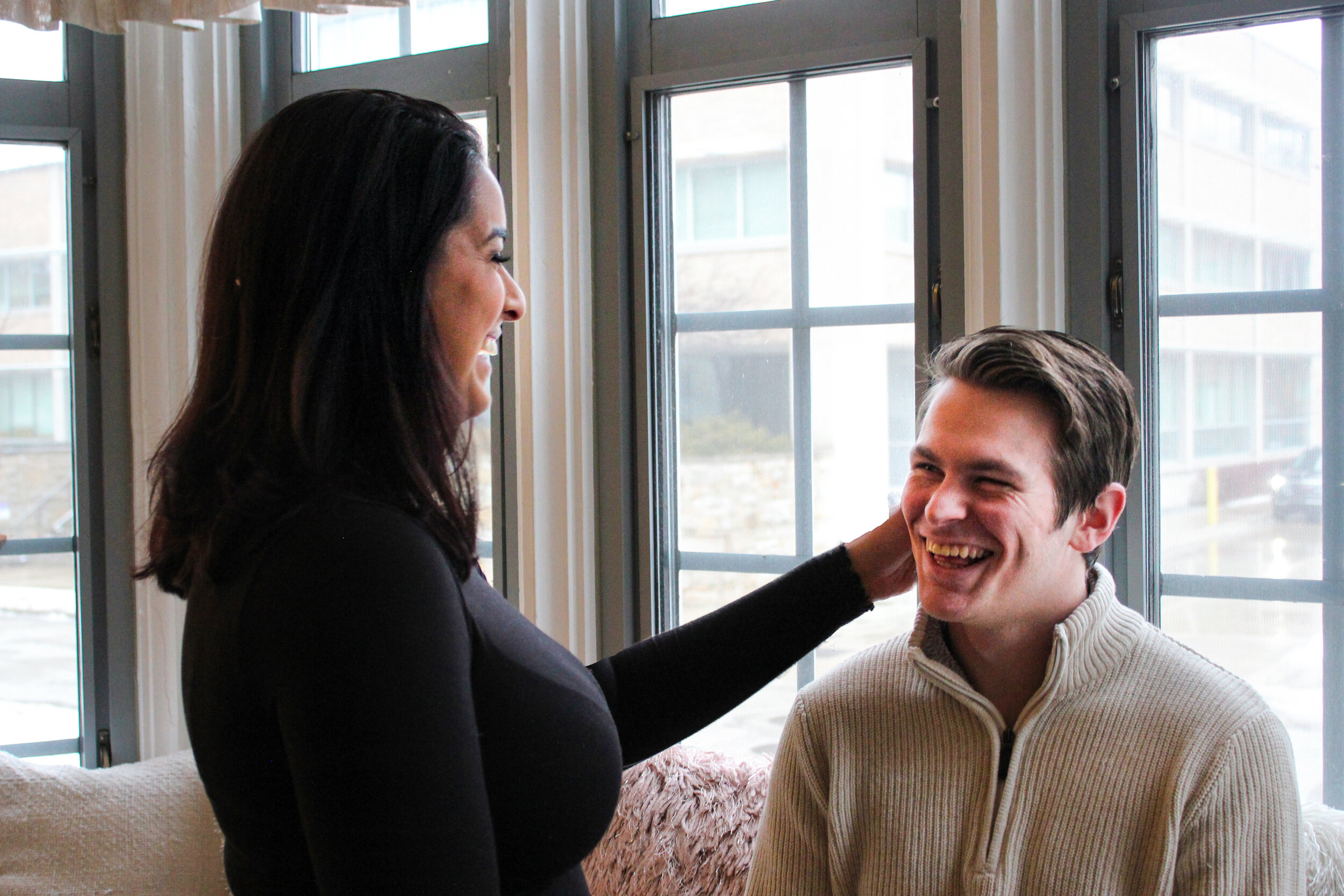The Nav & Conner Story


Photographed by Maryam Ikuforiji
It all started the Saturday night before their first spring quarter at Northwestern. Navpreet “Nav” — sitting alone in her dorm, talking to herself out of desperate boredom — decided to make a Tinder to get Juul pods. She did, in fact, manage to get the Juul pods, but as she was swiping on the infamous hook-up app, she unexpectedly discovered Conner.
Nav was instantly attracted to his chiseled face and eyebrows, and after ending a long-distance relationship with her boyfriend only three days prior, she needed a rebound.
“You’re just hot. I just want to fuck you,” she recalls saying after seeing her now boyfriend’s profile.
She swiped. They matched.
That night, he came over. They talked all night. He stayed over — they didn’t have sex the first time.
Conner talked about his life in Indiana — a part of his identity that Nav initially considered a “red flag.” “Oh God,” Nav thought, “I don’t know if you should leave.”
“I expected him to be racist and have a fetish for brown women,” she said.
Interracial dating often sparks insecurities surrounding the perceptions and opinions one’s family may have about them. Months into their relationship, prior to meeting Conner’s mother, Nav was so worried that his family would care that she was Indian.
McCormick sophomore Conner is the oldest of six siblings raised by a single mother in rural Indiana. He comes from a very Christian household, where his mother introduced him to the idea of sex at a young age. While he was taught what happens during sex, he was also told that sex was something precious, something that you needed to wait for. At the time, he didn’t second guess it — it was the right thing to do. However, as he grew into his own beliefs, he started to understand that he didn’t necessarily meet eye-to-eye with his parents, and so sex was not a topic of discussion.
Conner’s past high school relationship with a white, blonde girl also from a Christian family lasted approximately three-and-a-half years. Their sex life was very limited, Conner says, and due to her religious background, she always felt kind of guilty if she ever did anything.
Sex is talked about differently in various families, and sometimes, it's tied to identity and culture. However, despite what we’re taught about sex, our individual, everyday experiences also inform how we want to feel loved and wanted.
See, Nav, on the other hand, had a self-introduction to sex. At the mere age of six, she vividly remembers a scene from a movie that her parents were watching. “There was this one scene where a guy is running an ice cube down this girl’s stomach.” Although she didn’t understand the concept of sex at all—and her parents never talked about it—she knew that such an erotic scene was sexual.
Indian movies, as well, can be very erotic, according to Nav. That’s another way she was introduced to sex. “You dance to court,” Nav said, “there’s so much dancing in those fucking movies.” Typically, the women would do a little dance routine in their bed, and therefore, Nav thought that that’s how you were supposed to have sex.
Then in eighth grade, Nav started sex education, and, suddenly, she was fascinated by it (and to a point, almost obsessed with the idea of it).
She first had sex at the age of 15 with a boy she was dating for six months. She felt ready for it and not at all pressured. It didn’t feel good, it hurt, but she kind of liked the pain. It intrigued her. Then she started to really enjoy it and found herself wanting more. “In one year, I went from not knowing what a handjob was to having sex,” Nav said.
The Medill sophomore and Los Angeles local attended a predominantly white boarding school in Boston. Before leaving L.A. for ninth grade, Nav never questioned her beauty nor her skin color. One night in Boston, however, at the first dance of the school year, surrounded by mediocre-looking white boys, one boy came up to her and said, “Honestly, I think you’re really cute, but I only date white girls.”
She felt unwanted, and thus often settled for unfulfilling relationships in high school. Sex became the easiest way of making her impact on people’s lives.
The night after the two first met, Conner and Nav had sex.
“The first time I thought went surprisingly well,” according to Conner.
“I tore up his back, and it was just amazing,” Nav said. Like Conner, she didn’t expect their sexual chemistry to be so good the first time.
“We’re always very vocal about what we wanted,” Conner said, “and I think that helped us get very comfortable with each other very quickly, which I think turned into a big part of my relationship now.”
For Conner, sex feels comfortable. He feels confident with knowing what he wants from his partner, and communication is the key to that. “Learning how to communicate is probably the biggest thing that I’ve learned and gained from this relationship. Because Nav is always very open and helps me be very open as well,” he said.
“Just imagine dating somebody but they didn’t make you orgasm. You have to laugh at that,” Nav said.
“I guess I always wanted diversity in the guys that I got with. I have dated so many white guys, but I didn’t intend to do this,” Nav reveals about her initial hesitation for dating Conner. Approximately two months into their relationship, Nav asked Conner about how his family felt about him dating an Indian woman. Although he insisted that they wouldn’t care, Nav revealed that she wouldn’t want to get invested in a relationship that would get “fucked over” by her partner’s family.
“That’s a big thing that I care about. I’ve asked all my exes how their family feels about dating somebody outside of their race because it matters,” she said.
And Nav’s feelings are certainly valid. The awareness of negative social perceptions, and the stigmas or stereotypes associated with minorities and interracial couples, ultimately impacts the social-psychological experience of the relationship for both the minority and majority partner, according to Donna Lewandowski and Linda Jackson’s study on the “Perceptions of Interracial Couples: Prejudice at the Dydaci Level.” In their study, results showed how white men married to black women were perceived as less competent, and overall their relationship was rated as “less compatible.”
“I'm dating an Indiana boy who went to military boarding school. Like, there's a lot of red flags there. But also they've all turned out to be for the best,” Nav said.
Their relationship is a personification of the power of communication. “One thing I’ve had to work on is understanding her needs compared to mine,” Conner said.
“He has a really weird intuition whenever I’m upset or feeling insecure. He doesn’t make me feel crazy, and he doesn’t brush it off either,” Nav said.
Nav and Conner will be celebrating a year in April.
Editor’s Note: Nav and Conner asked for their last names to be excluded from the issue for privacy reasons.
